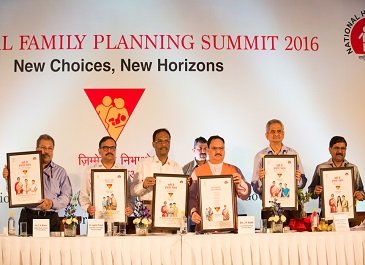JP Nadda inaugurates National Family Planning Summit 2016
April 05, 2016 | Tuesday | News | By BioSpectrum Bureau
JP Nadda inaugurates National Family Planning Summit 2016
Shri JP Nadda, Union Minister of Health and Family Welfare during the inauguration of The National Family Planning Summit 2016
"There has been a paradigm shift and family planning has now emerged as a key strategy to reduce maternal and child mortalities and morbidities". This was stated by Shri JP Nadda, Union Minister of Health and Family Welfare during his inaugural address at the two-day National Summit on Family Planning.
The Union Health Minister launched the new revamped logo for Family Planning media awareness campaign along with the 360 degree communication plan for enhanced awareness regarding various issues surrounding family planning in the country. Highlighting the importance of communication in addressing such issues, he noted that a comprehensive strategy has been worked out where maternal and child health and wellbeing have been placed at the Centre point of the new approach, Shri Nadda pointed out. Shri Amitabh Bachchan is the brand ambassador and anchor for the new communication approach. The IEC package has several TV and radio spots which focus on the role of various stakeholders such as the mother, father, mother-in-law, husband and other in the families as well as the role of community health workers, doctors, nurses, ANMs and ASHAs to educate and inform regarding the available choices. The promotion of family planning - and ensuring access to preferred contraceptive methods for women and couples - is essential for securing the well-being and autonomy of women, while supporting the health and development of communities, Shri Nadda stated.
Noting that Family Planning is a key development imperative, Shri Nadda said that Family planning reinforces people's rights to determine the number and spacing of their children. The freedom to personally determine the timing of a pregnancy strengthens above all the position of women in society. It helps reduce child mortality and improve maternal health, because many pregnancies in quick succession put mother and child at risk.
The Union Health Minister also stated the new strategic approach emphasizes continuum of care and integrated action, and Family Planning has now been put in the centre-stage as a major pillar of our RMNCH+A strategy to improve survival and health of women and children with special focus on delaying the first birth and spacing between births. The Health Minister highlighted the centrality of issues such a social and cultural practices, low literacy, poverty and lack of timely access to appropriate healthcare facilities.
"We know that Child survival, maternal health, increasing age at marriage, postponing the birth of the first child, increasing birth intervals, women's empowerment and employment, literacy and antipoverty efforts are important determinants for stabilizing the population", Shri Nadda stated.
Hence increasing access to family planning services can have a transformative effect on everything from poverty reduction to climate change - in short all aspects that matter for our nation.
The Health Minister informed that India has made notable progress in several health indicators. Considering that 45 percent of the maternal deaths occur in the age group 15 to 25 years where 52 percent of the total fertility is also clustered, we are moving from limiting to delaying and spacing for wider health benefits, he noted. There has been a sharp decline in decadal growth rate from 21.54 percent in 1990-2000 to 17.64 percent during 2001-11, the Health Minister added. The Total Fertility Rate (TFR) has also come down from 6 in 1951 to 2.3 in 2013, and 24 states/UTs have achieved the replacement level fertility of 2.1 or less.
Shri Nadda also awarded States for their contribution towards the Family Planning efforts of the country.









